Yoshiyuki Nezu, CEO, One to One Welfare Education Academy Co., Ltd., has been invited by a prominent figure in Saudi Arabia to visit Riyadh to inspect the medical and nursing care situation.
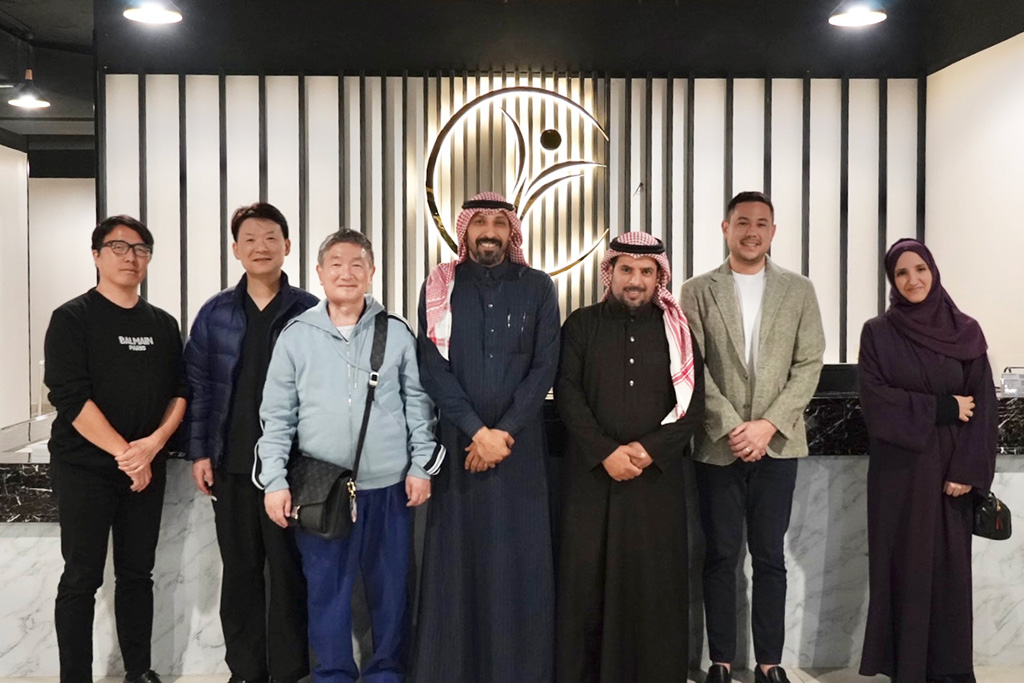
Yoshiyuki Nezu, CEO, One to One Welfare Education Academy Co., Ltd., has been invited by a dignitary in Saudi Arabia to visit Riyadh to inspect the medical and nursing care situation.
history to date
(1) Background
Prof. Nezu is a leading figure in the development of the nursing care infrastructure in Japan's super-aging society. The caregiving technique developed by Prof. Nezu is the only technique in the world that allows caregivers to move and transfer patients without back pain, and is the one and only technique that allows patients to be cared for safely and securely without pain.
Saitama Medical University, which has a JCI accredited university hospital that guarantees medical quality and patient safety, introduced Nezushiki Kaigogijutsu to all Saitama Medical University groups and standardized it as a caregiving technique for discharge guidance and education and for medical care workers, making Nezushiki Kaigogijutsu the first caregiving technique in the world with medical evidence.
The majority of the world's nations, which had given up on manual assistance and were steering toward assistance by machines, were astonished by Nezushiki Kaigogijutsu, which enables human hands to provide assistance without back pain, and it attracted a great deal of attention.
(2) Invitation to Principality of Monaco
In June 2022, the royal family of the Principality of Monaco, an aging society, invited Prof. Nezu to the Principality of Monaco to introduce his caregiving techniques (Nezushiki Kaigogijutsu) and Japanese nursing care (including equipment) and to provide educational guidance. The Principality of Monaco has made it clear that it intends to move forward as a medical care nation, and under the guidance of Prof. Nezu, a leading figure in the development of Japan's care infrastructure, plans to build infrastructure such as nursing and rehabilitation facilities and a care education system.
(3) Invitation to Dubai
In July 2022, Prof. Nezu was invited by a Saudi dignitary who was staying in Dubai for a summer vacation, and asked for cooperation in teaching nursing care techniques and building nursing care facilities and educational facilities. This invitation to Saudi Arabia (Riyadh) was intended to promote the full-scale development of a comprehensive medical care system in Saudi Arabia that integrates Western and Eastern medicine by combining Nezushiki Kaigogijutsu and Japanese wisdom.
2. Report on activities in Saudi Arabia (Riyadh)
Prof. Nezu was invited by a Saudi dignitary to visit Riyadh from January 22 to 26, 2023.
(1) Riyadh Day 1 (January 23)
Site visited (1): Naizak
The largest supply company in the Middle East, with a wide range of business activities including not only medical care equipment, but also laboratory information management systems, telecommunications, and oil fields.
<Interview details>
Prof. Nezu was introduced and informed that Nezushiki Kaigogijutsu is a technique with medical evidence and will be disseminated to Saudi Sarabia in the future, and that he has an immediate contact with a Japanese medical care equipment company. In addition, Japan has all kinds of know-how in the field of nursing care, since it has been forced to solve the problem of nursing care in just over 20 years due to the declining birthrate and aging population before any other country, and has developed its nursing care infrastructure. Therefore, we told them that if Saudi Arabia was serious about embarking on a long-term care infrastructure, we would be able to assist them.
<Summary>
They reaffirmed that Japan is at the forefront of nursing care and that Japanese nursing care equipment is world-class. In terms of nursing care equipment, they paid particular attention to shower baths and nursing care beds.
The only hospital in Saudi Arabia specializing in rehabilitation.
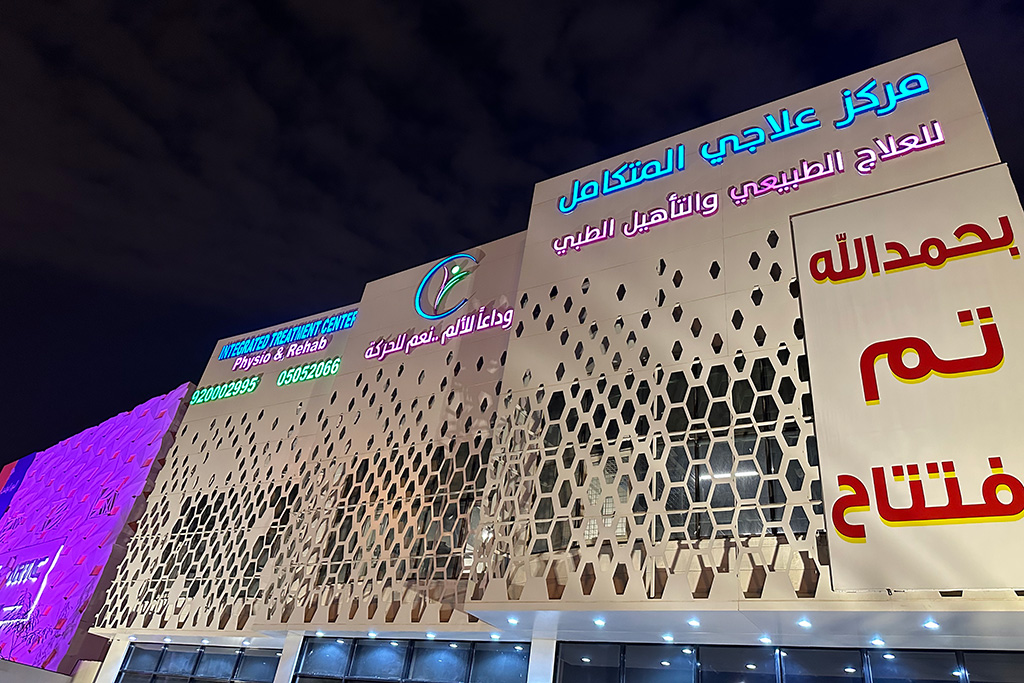
Night view of Integrated Treatment Center
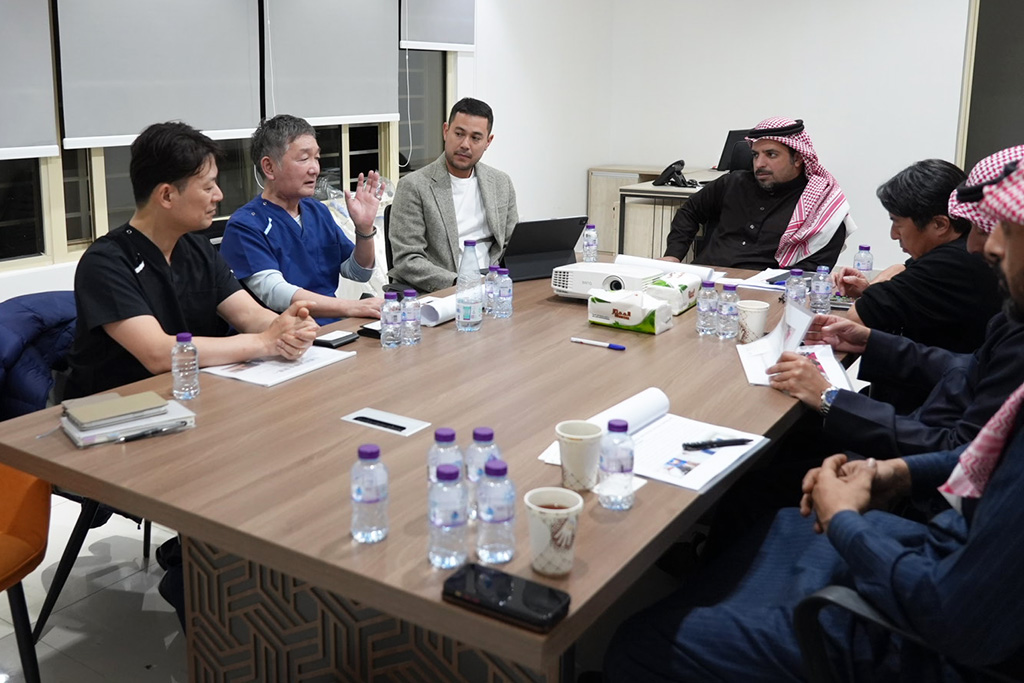
Meeting at Integrated Treatment Center
<Interview details>
The head of the hospital introduced the hospital as the only hospital in Saudi Arabia specializing in rehabilitation. He mentioned that there is not a single nursing home and that home care is an issue for the future because there is no established guidance and education system when transitioning from the hospital to home care.
Prof. Nezu explained how much suffering it would be for the patient to return home without functional improvement due to functional decline or functional deficit after treatment, and how miserable the situation would be for family members to care for the patient without knowing how to take care of him or her, and everyone agreed.
When Prof. Nezu gave a lecture on Nezushiki Kaigogijutsu, the hospital directors were astonished at the caregiving techniques that do not use force and do not burden their backs. After experiencing Nezushiki Kaigogijutsu firsthand, the rehabilitation hospital director expressed his strong desire for the spread of Nezushiki Kaigogijutsu in Saudi Arabia.
The tour was followed by a tour of the facilities of a hospital specializing in rehabilitation. It was confirmed that the facility is equipped with rehabilitation equipment and other hardware.
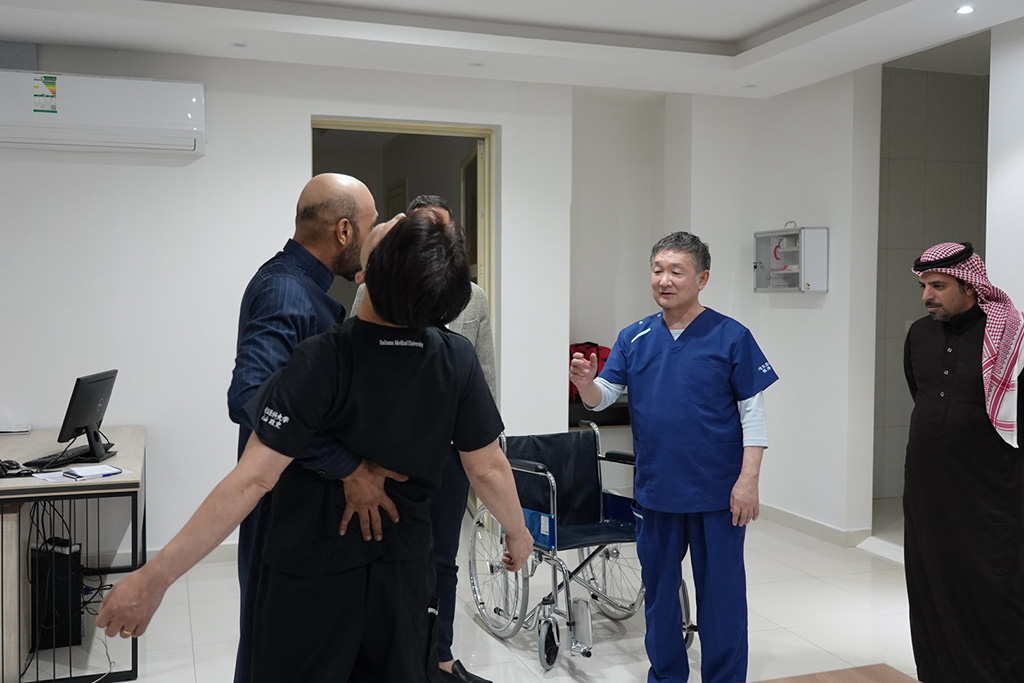
Prof. Nezu teaching Nezushiki Kaigogijutsu
<Summary>
There was a great need to promote Prof. Nezu's back-breaking caregiving techniques. It seemed urgent for Saudi Arabia to develop the nursing care infrastructure needed for the transition from hospital to home. There was a strong demand for technical guidance on Nezushiki Kaigogijutsu during the next visit.
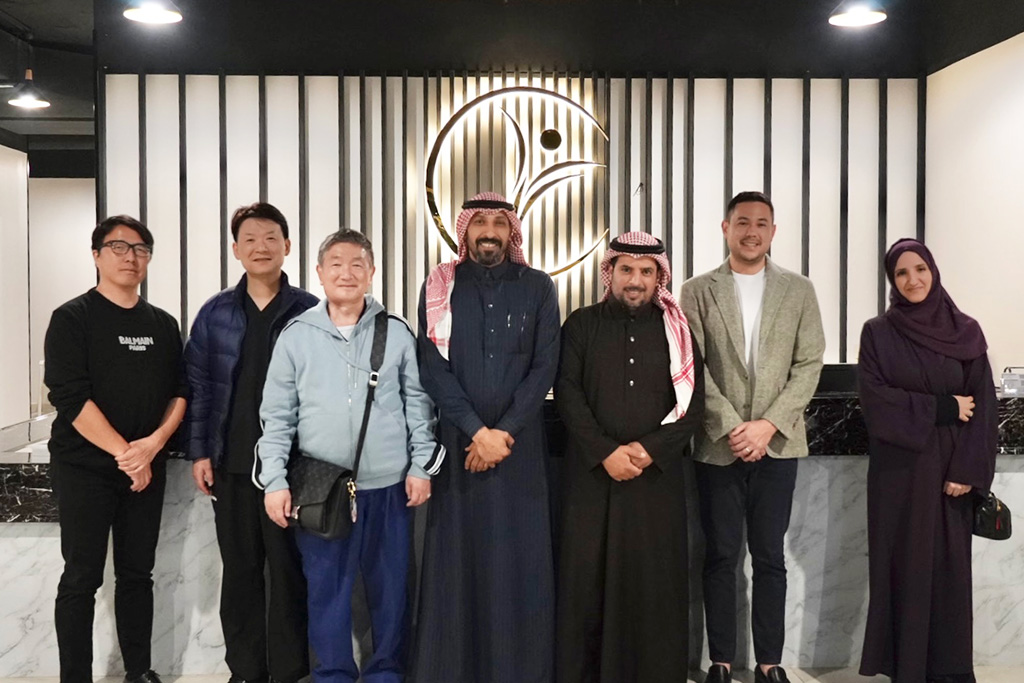
At the front entrance of the Integrated Treatment Center
The director of the rehabilitation hospital later sent a letter of appreciation as follows.
Friends, I am very happy to hear from you. It was a great honor and pleasure for us to meet such iconic people as Prof. Nezu and Drs. The birth story of how Professor Nezu overcame his disability and developed his nursing care techniques is truly deeply inspiring to millions of people around the world, and has great potential to help each person become more independent and improve their quality of life, mainly here in Saudi Arabia. The simplicity of Professor Nezu's techniques and methods is incredible. I personally would love to learn more. Our expertise team strongly believes that Nezushiki Kaigogijutsu will be highly regarded for its ability to safely move and transfer people with disabilities with minimal effort."
(2) Riyadh Day 2 (January 24)
The group visited five hospitals in Riyadh and met with representatives from each hospital.
Visits (1): DR. MOHAMMAD ALFAGIH Hospital
A 350-bed general hospital consisting of an outpatient wing and an inpatient wing across a corridor.
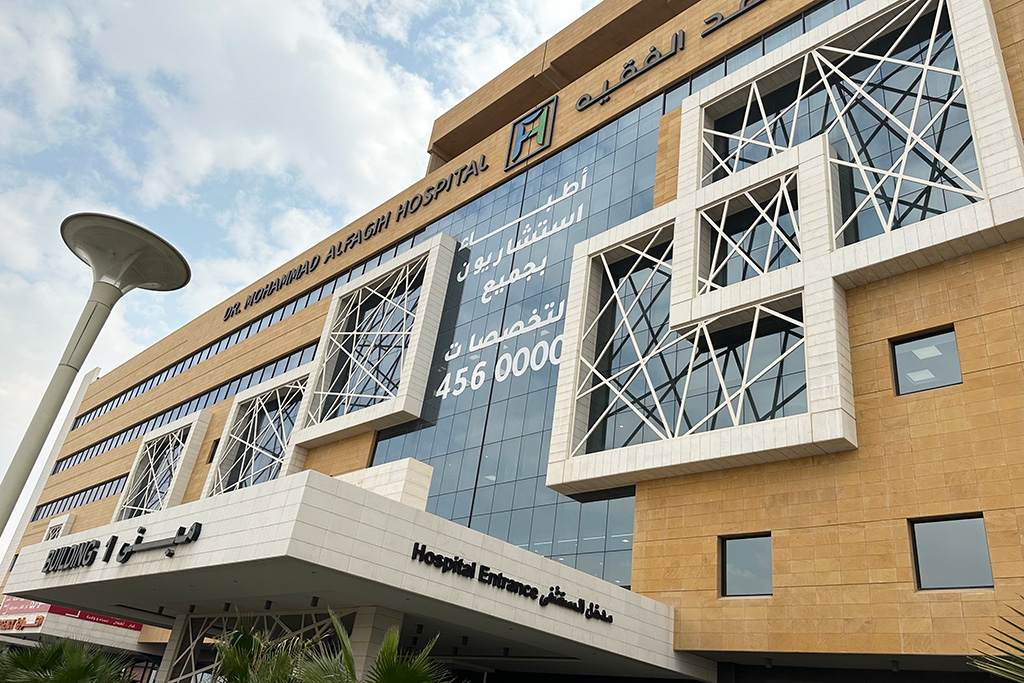
In front of the entrance of DR. MOHAMMAD ALFAGIH Hospital
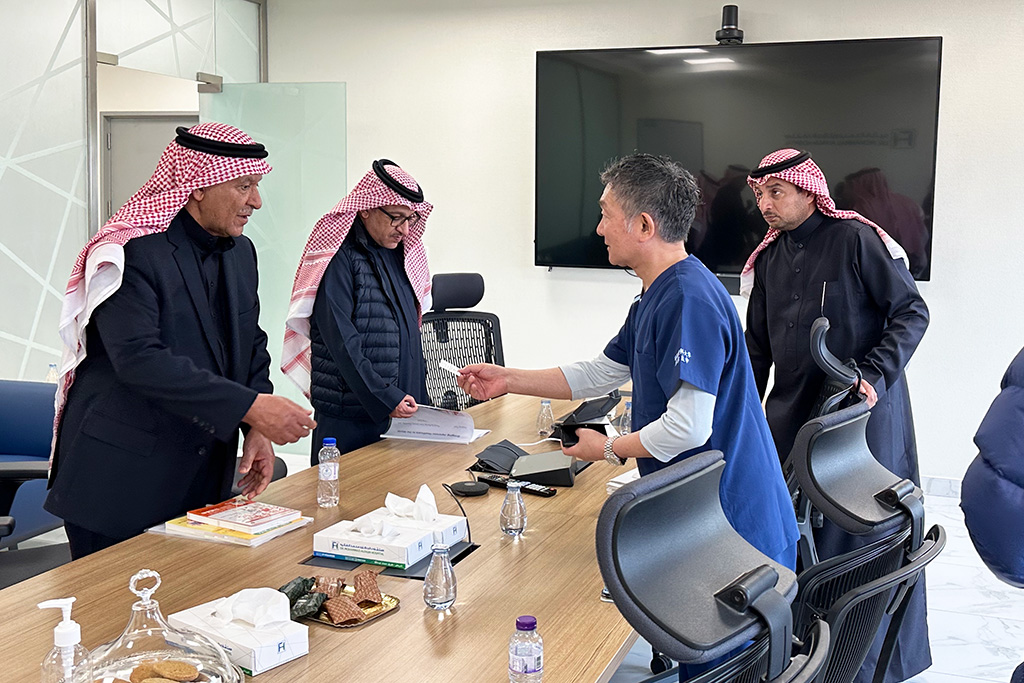
Business card exchange in the meeting room on the top floor
<Interviews>
The hospital director showed us around the inpatient and outpatient wings. The hospital administrators showed great interest in Nezushiki Kaigogijutsu. The hospital demonstrated Nezushiki Kaigogijutsu, including standing up from a wheelchair. The hospital director, who was well dressed, was able to stand up easily, and was convinced that Nezushiki Kaigogijutsu was different from the conventional nursing care techniques that he knew.
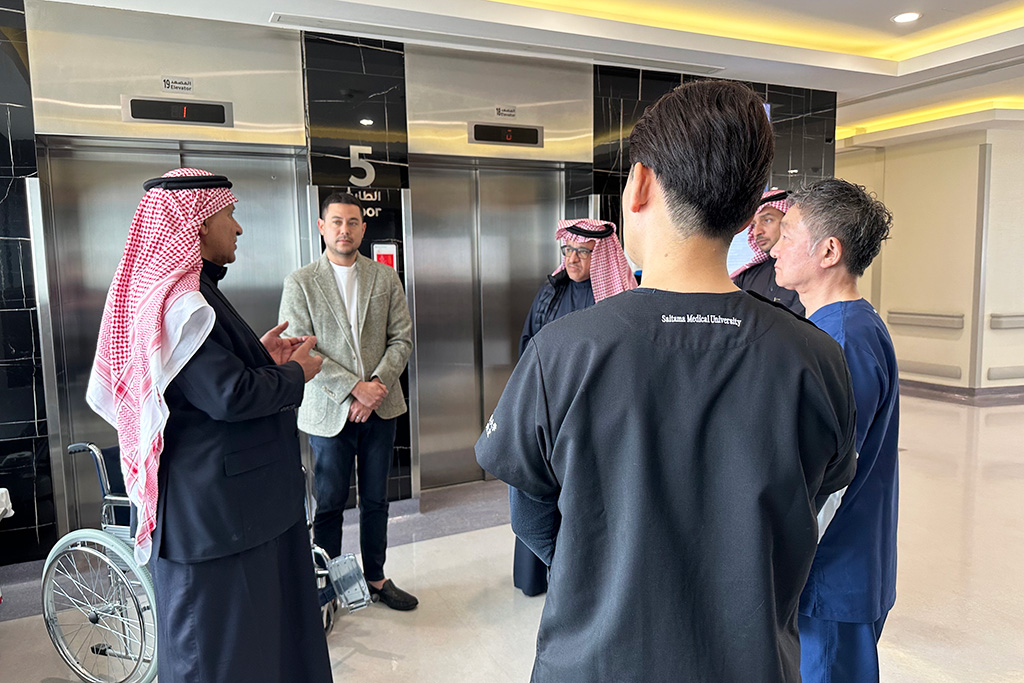
Prof. Nezu lectures on Nezushiki Kaigogijutsu.
<Summary>
We had the impression that Saudi Arabia is comparable to Japan in terms of medical standards, medical equipment, and other hardware. What they were in high demand for was Nezushiki Kaigogijutsu, and they acknowledged that Nezushiki Kaigogijutsu is a caregiving technique that does not place a burden on their backs. Shower baths and hot shower chairs were new to them, and they showed great interest in them.
Visits (2): Kingdom Hospital
Private hospital located in northern Riyadh
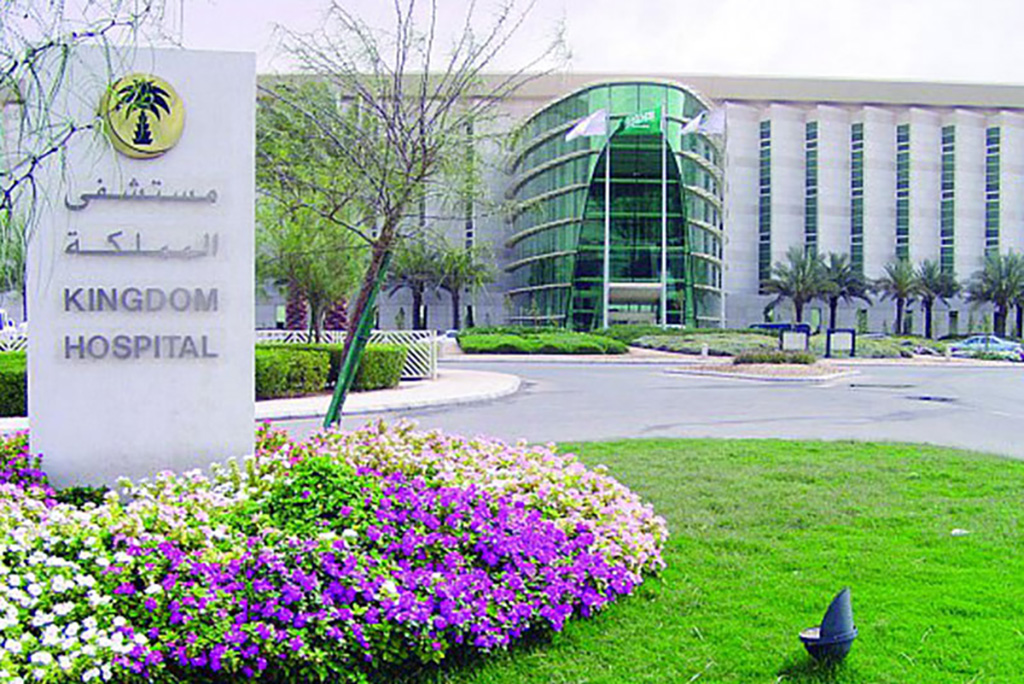
Photo reference: https://kingdomhospital.net/en/
<Interviews>
When I explained that Nezushiki Kaigogijutsu is the world's first caregiving technique with medical evidence and is the one and only caregiving technique that does not place any burden on the lower back, he said that in Saudi Arabia there are no caregiving techniques that do not cause back pain and that it will be a very important factor in the future of caregiving in Saudi Arabia. We told the participants that if they wanted to promote Nezushiki Kaigogijutsu in Saudi Arabia, we could cooperate with them through videoconference after we returned to Japan.
<Summary>
The hospital is focused on home care and was very supportive, showing interest not only in nursing care technology but also in cutting-edge Japanese nursing care education and nursing care infrastructure development.
Visits (2): King Faisal Specialist Hospital
Located in the center of Riyadh city, this hospital is accredited with the same JCI Academic version as Saitama Medical University International Medical Center, opened in 1975.
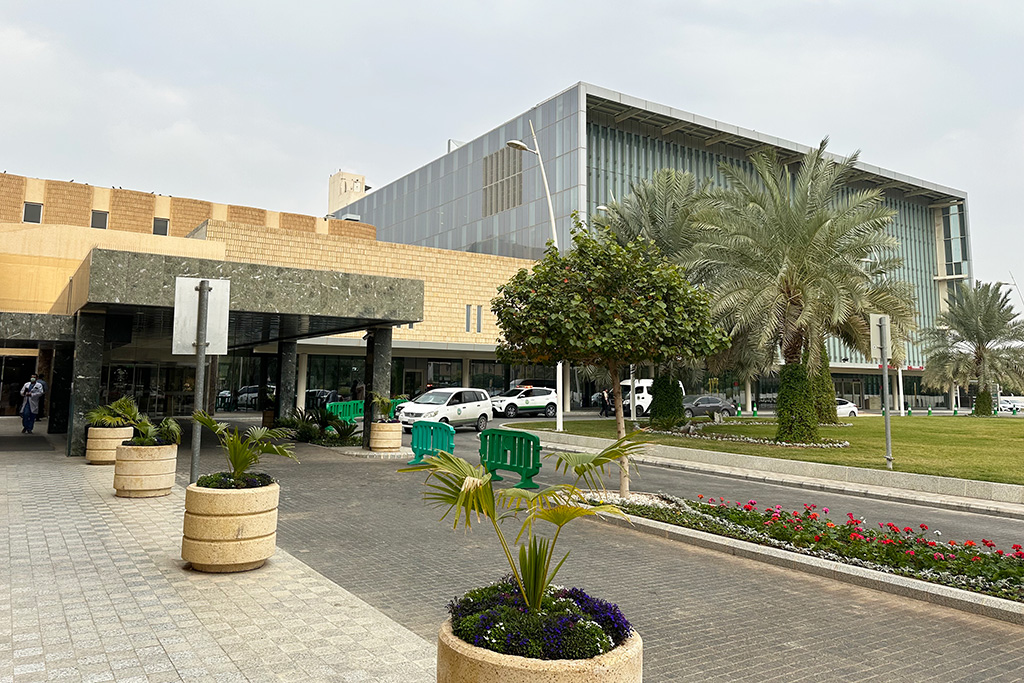
King Faisal Specialist Hospital
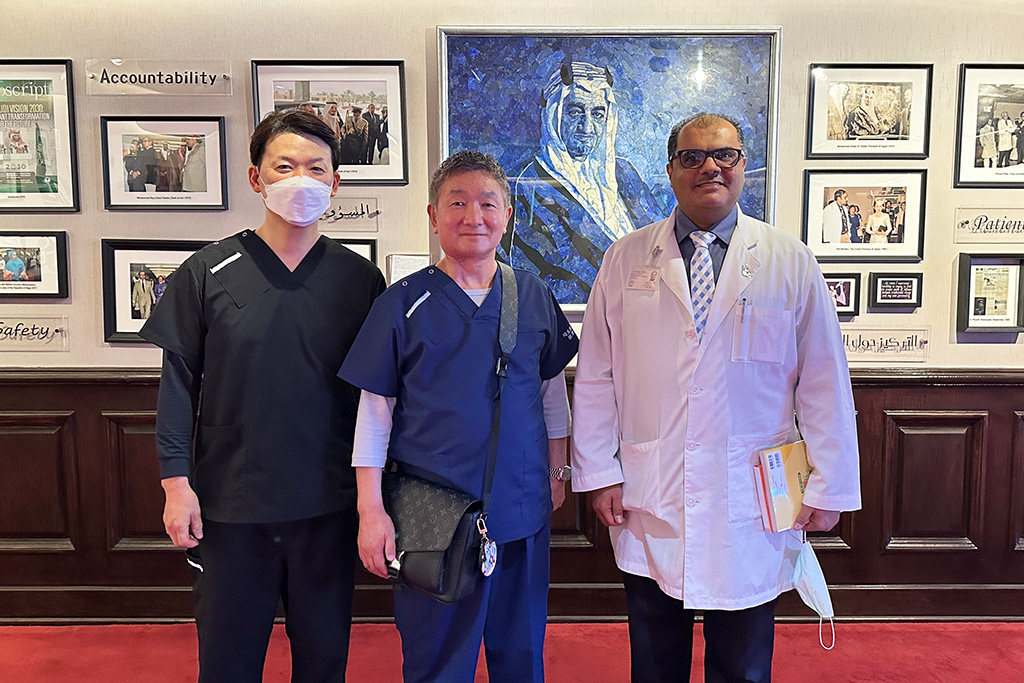
At the hospital lobby
<Interviews>
Each department head introduced himself and expressed his hospitality. Everyone was quiet and listened attentively as Prof. Nezu told the secret story of how he developed Nezushiki Kaigogijutsu as a way for his family to survive after he suffered a stroke. After Prof. Nezu's talk, the department heads sitting around the round table were impressed by the birth story of Nezushiki Kaigogijutsu and gave their utmost compliments, understanding that it is a caregiving technique that does not burden the back and that patients can receive care safely and securely. They all commented that they hope that the next time we come to Saudi Arabia, they will have time to experience Nezushiki Kaigogijutsu firsthand.
Prof. Nezu's comments were very moving: "I would very much like to help relieve the suffering of back pain caused by nursing care for family members," and "I would like to help Saudi Arabia when it faces the future of Japan's aging population and declining birthrate, which has forced Japan to develop a nursing infrastructure in a short period of only 22 years. Prof. Nezu said that he would be willing to cooperate in solving future nursing care issues in Saudi Arabia.
<Summary>
King Faisal Specialist Hospital has a long history and is JCI accredited with the highest patient safety goals in the world, so the department heads understood the importance of assuring patient safety. They understood that Nezushiki Kaigogijutsu is a technique that not only prevents back strain but also prevents patients from falling. Furthermore, they understood the importance of Nezushiki Kaigogijutsu, which is backed by medical evidence, because they knew the danger of not having a standardized nursing care technique. This was a moment that greatly increased the possibility of a practical training course in the Nezu method of caregiving during the next visit to Saudi Arabia.
Visits (4): New You Medical Center
Private hospital focusing on cosmetic and plastic surgery.
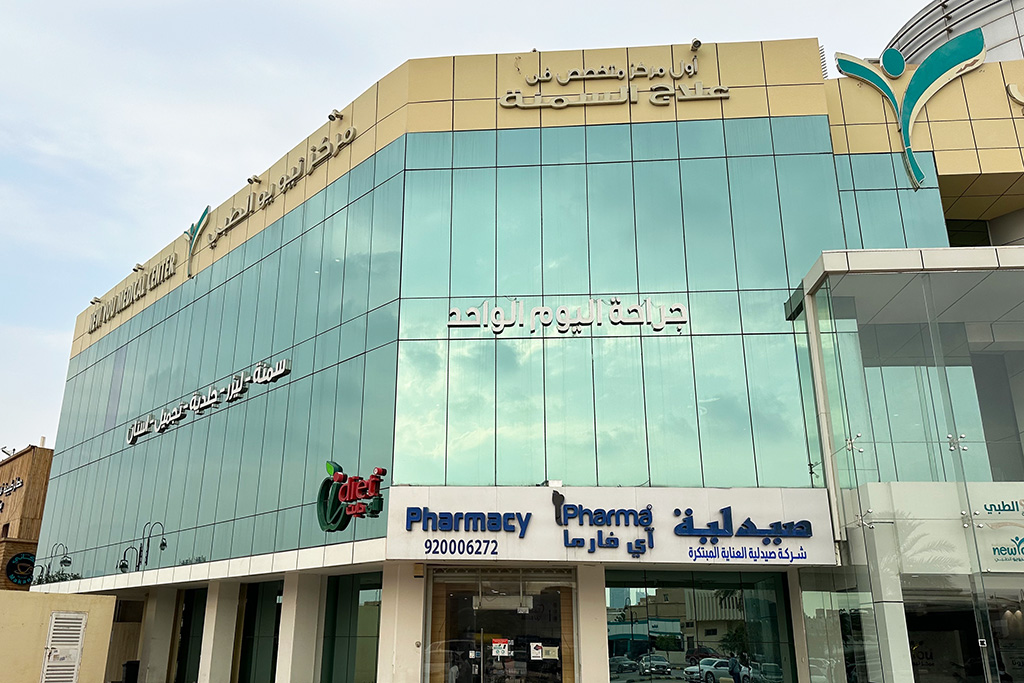
Front of New You Medical Center
<Interviews>
We explained about rehabilitation based on a comprehensive medical care system that combines Western and Eastern medicine, as well as about Japanese medical care equipment. He expressed great interest in Japanese medical and nursing care equipment, especially those not available in Saudi Arabia, and said he would be happy to provide advice on the introduction of medical and nursing care equipment.
<Summary>
They expressed interest in Japan's trustworthy and reliable medical care equipment and were willing to offer advice on its introduction.
Visits (4): DR SULAIMAN AL HABIB Hospital
Private hospital located in the center of Riyadh, established in 1995.
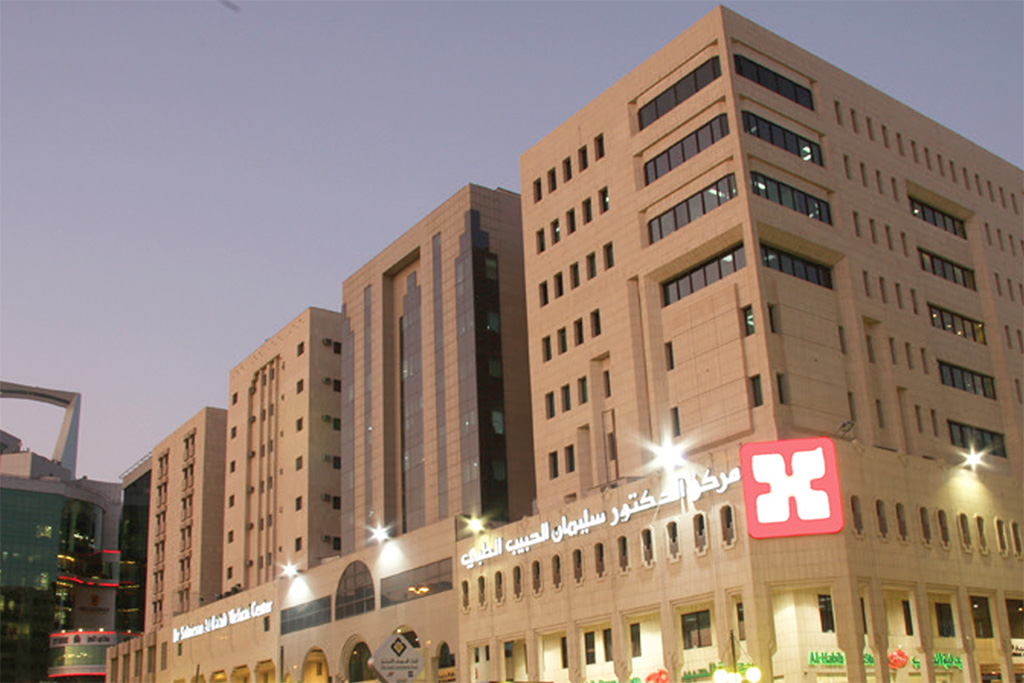
Photo reference: https://hmg.com/en/Medical-Facilites/Pages/default.aspx?itemid=13
<Interviews>
Prof. Nezu told the secret story of the birth of Nezushiki Kaigogijutsu. He was unable to speak, eat, turn over, or even defecate by himself. He also told how his wife had a severe hernia and was forced to use only one arm to care for their newborn baby, and how Nezushiki Kaigogijutsu was developed as a way of life, and that it existed for each level of caregiving by Prof. Nezu and each condition of his wife's hernia, and that he had not developed it to spread it around the world.
Prof. Nezu told us that he had been spreading Nezushiki Kaigogijutsu in Japan, and now he was coming from Saudi Arabia to spread Nezushiki Kaigogijutsu to the world to help people suffering from caregiving, first to relieve the suffering of people in Saudi Arabia who are suffering from back pain due to caregiving. In response to Prof. Nezu's offer to help if necessary, the hospital director said, "I was very impressed when I heard the story of the birth of Nezushiki Kaigogijutsu. I hope you will help those who are suffering from nursing care in Saudi Arabia.
Prof. Nezu was asked, "After experiencing rehabilitation for a stroke, and now for cancer, has your thinking about rehabilitation changed now?" Prof. Nezu answered, "I had stage 4 cancer and underwent a pectoralis major myocutaneous flap transplantation, which left me unable to move my right hand. I did rehabilitation, but rehabilitation involves pain. About 70% of patients give up rehabilitation because of the pain. A person who has lost his pectoralis major muscle usually can only raise his arm up to 90 degrees, but I independently reviewed and performed rehabilitation, and now I can raise my arm up to the top. The most important things in rehabilitation are (1) alleviating cancer pain and nerve pain, and the most effective were acupuncture, moxibustion, and pressure point massage in Oriental medicine. The next important thing is (2) to perform rehabilitation without the burden of one's own body weight. Rehabilitation without the burden of one's own body weight can increase the range of motion. And (3) the most important thing is to conduct rehabilitation through a comprehensive medical care system that combines Oriental and Western medicine”.
<Summary>
They showed great interest in Nezushiki Kaigogijutsu, which was developed as a way of life, not as a mental concept. We had an online meeting for the next visit to Sarabia, Saudi Arabia, and decided to make arrangements for a practical training of Nezushiki Kaigogijutsu next time. After listening to Prof. Nezu's talk on cancer rehabilitation, their concept of cancer rehabilitation seemed to have changed, and they expressed their understanding of the necessity and importance of a comprehensive medical care system that combines Western and Eastern medicine for functional improvement and recovery.
(3) Care equipment
Medical equipment was almost fully stocked, but we did not see any nursing care equipment, especially those made in Japan.
There is no such thing as a shower bath, which is unique to Japan, and everyone was extremely interested in it. As for beds, there is a full range of medical beds used for hospitalization, but in Saudi Arabia there is no distinction between "medical" and "nursing care" beds, and medical beds are used at home as well. They were extremely interested in the nursing care beds used at home in Japan.
3. summary
After this visit, it was apparent that although medical care is well provided, issues related to nursing care and the development of infrastructure for nursing care are still being worked on.
Since the dawn of history, Japan has been exposed to the wave of an aging society with a declining birthrate faster than any other country, and has been forced to develop a nursing care infrastructure in a short period of only 23 years (the nursing care insurance system came into effect in 2000). In the face of various nursing care issues, Japan has worked to solve problems related to nursing care by, for example, creating comprehensive community care.
Countries around the world are now closely watching Japan to prepare for the aging issues that they will face in the future. I realized that the future will definitely be an era of care and welfare.
(Reported by Associate Dean of Saitama Medical University)
- PREV
LECTURESaitama Medical University "Nursing and Care Technology Project Promotion Committee" was launched and Yoshiyuki Nezu, CEO of One to One Welfare Education Academy, Co., Ltd. and Visiting Professor of Saitama Medical University, was appointed as the chairman of the executive committee. - NEXT
BOOK/MEDIAYoshiyuki Nezu’s book " Saitama Medical University Style: Comprehensive Techniques for Assistance that Require No Force " was released by Kodansha on April 27, 2023!



